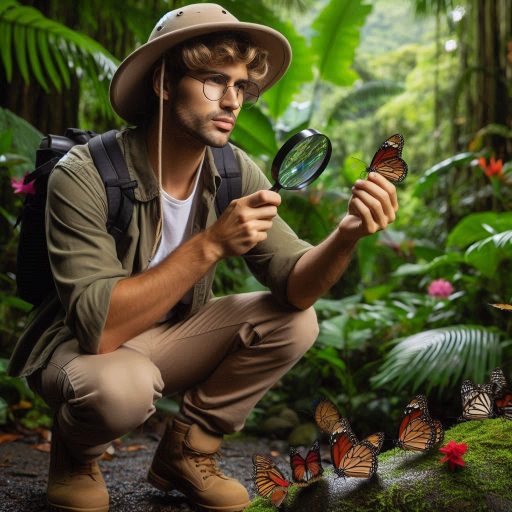Introduction
Zoologists play a crucial role in environmental policy making.
They bring valuable scientific knowledge to the decision-making table.
Policymakers rely on their expertise to create effective conservation strategies.
By studying animal behavior and ecosystems, zoologists inform policies that protect biodiversity.
Their research identifies species at risk and highlights urgent conservation needs.
Zoologists contribute to shaping policies that address environmental challenges.
They work closely with governments and organizations to develop evidence-based regulations.
Their findings guide initiatives to preserve habitats and manage wildlife populations.
This collaboration ensures that policies reflect the realities of ecological systems.
Additionally, zoologists promote conservation efforts by educating the public.
They raise awareness about the importance of protecting endangered species.
Through outreach programs, they engage communities in conservation practices.
By fostering a connection between people and nature, zoologists inspire action to safeguard ecosystems.
Zoologists significantly impact environmental policy making.
Their expertise shapes effective regulations that foster biodiversity conservation.
Through research and public education, they advocate for a sustainable future for all living organisms.
Conducting Research on Biodiversity
Zoologists play a crucial role in understanding biodiversity.
They study various animal species and their habitats to gather essential data.
This research forms the foundation for effective environmental policies.
Studying Animal Species and Habitats
Zoologists examine numerous animal species across different ecosystems.
They focus on behavior, population dynamics, and interactions with other species.
By observing these factors, zoologists gain insights into the health of ecosystems.
Field studies allow zoologists to collect vital information about habitats.
They document environmental changes affecting species, such as habitat destruction or climate change.
This data helps identify endangered species and populations at risk.
Zoologists also conduct laboratory studies to analyze genetic diversity.
Understanding genetics enables them to assess the adaptability of species.
This information is critical for predicting how species respond to environmental changes.
Providing Valuable Data for Policymakers
The research conducted by zoologists provides valuable data for policymakers.
Decision-makers rely on this information to create effective conservation strategies.
The data helps them understand the implications of human activities on wildlife.
Zoologists present their findings in accessible formats.
They often publish reports, scientific papers, and policy briefs.
These documents summarize key insights and recommendations for action.
Policymakers use zoological research to inform legislation and regulations.
For example, data on endangered species populations can prompt protective measures.
Research findings may lead to the establishment of protected areas or wildlife reserves.
Influential Research Projects
Several specific research projects have significantly influenced environmental policy.
One notable project is the research on the California condor.
Zoologists studied the species‘ decline due to habitat loss and lead poisoning.
Their findings prompted California to ban lead ammunition in the state.
This policy change helped improve the condor’s population recovery.
Another example is the research on coral reef ecosystems.
Zoologists studied the impacts of climate change and pollution on reef health.
Their work contributed to the establishment of marine protected areas.
These areas aim to conserve biodiversity and support ecosystem resilience.
A third impactful project involved the study of the African elephant.
Zoologists documented the effects of poaching on elephant populations.
Their research supported international efforts to combat illegal wildlife trafficking.
As a result, stricter regulations were implemented to protect these majestic animals.
Zoologists significantly contribute to environmental policymaking through their research on biodiversity.
Their studies of animal species and habitats provide essential data for informed decision-making.
The influence of specific research projects highlights the importance of zoological work in protecting our planet’s biodiversity.
Through active engagement and collaboration with policymakers, zoologists help shape effective environmental policies for the future.
Identifying Endangered Species
Zoologists play a critical role in identifying species at risk of extinction.
Their expertise helps in understanding wildlife populations.
They conduct field studies to monitor species‘ numbers and their habitats.
Through research, they gather data on population trends and threats.
This information allows zoologists to assess which species are endangered.
How zoologists work to identify species at risk of extinction
Zoologists evaluate various risk factors affecting species.
They analyze habitat destruction, climate change, and pollution.
They also study the impact of invasive species on native wildlife.
By identifying these threats, zoologists can better predict which species face extinction.
This proactive approach allows for timely conservation efforts.
Importance of Protecting Endangered Species
Protecting endangered species is crucial for ecosystem balance.
Each species plays a unique role in its environment.
When one species declines, it can disrupt the entire ecosystem.
For example, predators help control prey populations, preventing overgrazing.
Loss of any species can lead to unintended consequences.
Thus, maintaining biodiversity is vital for healthy ecosystems.
Zoologists emphasize that protecting endangered species benefits humans too.
Healthy ecosystems provide essential services such as clean air, water, and food.
They also help in disease regulation and pollination.
By conserving endangered species, we safeguard the planet’s health for future generations.
Advocacy for Protective Policies
Zoologists advocate for policies that protect endangered species.
They use their research to inform decision-makers about the status of species.
This advocacy includes submitting reports and participating in public hearings.
Zoologists often collaborate with government agencies and non-profits.
Their collective efforts raise awareness about endangered species issues.
Zoologists also educate the public about conservation.
They conduct outreach programs to inform communities about local wildlife.
This engagement fosters public support for conservation initiatives.
By raising awareness, zoologists help mobilize resources for protecting endangered species.
Legislation plays a significant role in species protection.
Zoologists contribute to creating laws that safeguard wildlife.
They provide scientific data that shapes policies like the Endangered Species Act.
This act offers protections for species listed as endangered.
Zoologists help ensure that laws are based on sound science.
They push for stricter regulations on habitat destruction and pollution.
Zoologists collaborate with various stakeholders to promote conservation.
They work with wildlife managers, policymakers, and conservationists.
This collaboration leads to comprehensive strategies for protecting endangered species.
By sharing knowledge and resources, they enhance conservation efforts.
Zoologists are vital in identifying endangered species and advocating for their protection.
Their research informs policies that help maintain ecological balance.
Protecting endangered species is not just about saving individual animals.
It is about preserving ecosystems that sustain life on Earth.
Through their dedication, zoologists contribute significantly to environmental policy-making.
Their efforts ensure a healthier planet for future generations.
Read: Botany Career Fairs and Networking Events
Monitoring Wildlife Populations
Zoologists play a crucial role in monitoring wildlife populations.
They employ various methods to track animal species and their trends over time.
Through these efforts, zoologists contribute valuable data that informs conservation strategies.
Tracking Population Trends
Zoologists utilize several techniques to monitor animal populations.
They conduct field surveys, utilizing camera traps, radio collars, and direct observation.
These methods help them gather accurate data on species numbers and distribution.
Additionally, they analyze historical data to identify trends in population dynamics.
This comprehensive approach allows zoologists to assess the status of various species effectively.
Assessing Ecosystem Health
Monitoring population trends provides insight into ecosystem health.
When zoologists observe declining populations, it often indicates broader environmental issues.
For example, a decline in predator species may suggest overhunting or habitat loss.
Conversely, stable populations can indicate a healthy ecosystem.
Zoologists analyze this data to understand the interconnections within ecosystems.
They study how species interact and influence one another, identifying key indicators of ecosystem stability.
Collaboration with Policymakers
Zoologists frequently collaborate with policymakers to develop effective conservation strategies.
They present their findings to governmental and non-governmental organizations.
This collaboration ensures that conservation policies are based on scientific evidence.
Policymakers rely on zoological data to prioritize species and habitats in need of protection.
By translating scientific findings into actionable policies, zoologists help shape sustainable practices.
Zoologists also participate in public awareness campaigns.
They educate communities about the importance of monitoring wildlife populations.
Increased public engagement fosters a greater appreciation for biodiversity.
This support often leads to stronger conservation initiatives.
Furthermore, zoologists assist in the development of wildlife management plans.
These plans outline specific actions to protect endangered species and their habitats.
By sharing their expertise, zoologists help create effective strategies that align with local and national conservation goals.
In addition, zoologists contribute to the development of monitoring programs.
These programs track the effectiveness of conservation efforts over time.
By evaluating outcomes, zoologists ensure that strategies remain relevant and effective.
They adapt approaches based on new data and emerging challenges.
Through their work in monitoring wildlife populations, zoologists make significant contributions to environmental policy.
They provide the data needed to assess ecosystem health and inform conservation strategies.
Their collaboration with policymakers bridges the gap between science and action.
Zoologists play a vital role in monitoring wildlife populations.
Their efforts track trends, assess ecosystem health, and collaborate with policymakers.
This work ensures that conservation strategies are grounded in science, ultimately leading to healthier ecosystems and sustainable wildlife populations.
By understanding and protecting wildlife, zoologists contribute to a more balanced and thriving environment.
Read: Preparing for a Botany PhD: Tips and Advice
The Impacts of Human Activities on Wildlife
Zoologists play a vital role in understanding how human activities impact wildlife.
Their research focuses on deforestation, pollution, and climate change.
Each of these activities poses significant threats to animal populations and their habitats.
Studying Human Impacts
Zoologists conduct extensive field studies to observe wildlife behaviors and populations.
They gather data on species affected by habitat loss due to deforestation.
For example, they track animal migration patterns and breeding success in altered environments.
In polluted areas, zoologists assess how contaminants affect animal health.
They study the effects of toxins in waterways on fish populations.
Their research helps understand how pollution impacts not only individual species but entire ecosystems.
Zoologists also analyze the consequences of climate change.
They observe changes in animal distribution due to shifting climates.
For example, they track species moving to higher elevations or latitudes in search of suitable habitats.
These studies provide critical insights into how climate change affects biodiversity.
Transform Your Career Today
Unlock a personalized career strategy that drives real results. Get tailored advice and a roadmap designed just for you.
Start NowZoologists employ various methods to collect data on wildlife populations.
They use GPS tracking to monitor animal movements.
Camera traps help capture images of elusive species, providing valuable information about population dynamics.
Additionally, zoologists conduct surveys and ecological assessments to gather quantitative data.
This information includes population sizes, reproductive rates, and mortality rates.
By analyzing these data sets, zoologists identify trends and patterns that reveal the impacts of human activities.
Informing Policy Decisions
The data collected by zoologists plays a crucial role in shaping environmental policies.
Policymakers rely on this research to make informed decisions that protect wildlife.
By presenting their findings, zoologists highlight the urgent need for regulation.
For example, studies on deforestation have led to the implementation of stricter logging regulations.
These regulations help preserve critical habitats for endangered species.
They ensure that logging practices do not compromise biodiversity.
In response to pollution findings, governments have established water quality standards.
These standards limit the discharge of harmful substances into ecosystems.
Zoologists’ research helps ensure that aquatic life remains healthy and resilient.
Climate change studies have prompted international agreements aimed at reducing greenhouse gas emissions.
Policymakers use zoologists’ findings to advocate for sustainable practices.
These actions are essential in mitigating the impacts of climate change on wildlife.
Examples of Regulations
Several regulations have emerged based on zoologists’ research findings.
The Endangered Species Act is one notable example.
This legislation aims to protect critically endangered species and their habitats.
Zoologists‘ data informs recovery plans for these species.
Another example is the Clean Water Act.
This law regulates pollutant discharges into U.S. waters.
Research conducted by zoologists has played a significant role in shaping its provisions.
Their findings help policymakers understand the importance of maintaining water quality for aquatic life.
Zoologists analyze human activities’ impacts on wildlife through comprehensive research.
Their findings inform critical policy decisions, ensuring wildlife conservation and ecosystem health.
The ongoing collaboration between zoologists and policymakers is essential for sustainable environmental management.
Read: Interdisciplinary Research: Botany and Other Sciences

You Might Also Like: Geologists’ Contributions to Mining and Resources
Collaborating with Government Agencies
Zoologists play a vital role in shaping environmental policies.
Their collaboration with government agencies fosters effective conservation strategies.
Through these partnerships, zoologists provide essential scientific expertise to policymakers.
This section highlights how these collaborations develop and implement impactful environmental policies.
Developing and Implementing Effective Policies
Zoologists work closely with government agencies to develop comprehensive environmental policies.
They share their knowledge on wildlife behavior, population dynamics, and habitat needs.
This information helps policymakers understand the ecological impacts of their decisions.
By engaging in discussions, zoologists ensure that conservation measures align with scientific evidence.
Zoologists also participate in policy formulation processes.
They help assess the current status of wildlife and ecosystems.
This assessment guides the creation of policies that promote sustainability.
Policymakers rely on zoologists to identify priorities and target areas for conservation.
This partnership enhances the effectiveness of regulatory frameworks.
Providing Scientific Expertise
Zoologists serve as valuable resources for government agencies.
Their expertise helps inform legislation that protects wildlife and habitats.
They conduct research that contributes to understanding ecological systems.
Policymakers utilize this research to craft informed decisions about land use and resource management.
Additionally, zoologists offer insights into the effects of human activities on wildlife.
They evaluate how habitat destruction, pollution, and climate change impact ecosystems.
This expertise is critical when developing strategies to mitigate these effects.
By translating complex scientific data into actionable recommendations, zoologists empower policymakers to enact meaningful change.
Successful Collaborations in Conservation
Numerous successful collaborations illustrate the impact of zoologists on environmental policies.
One notable example is the partnership between zoologists and the U.S. Fish and Wildlife Service.
Together, they developed the Recovery Plan for the California Condor.
This endangered species faced extinction due to habitat loss and lead poisoning.
Zoologists conducted extensive research on condor populations and habitat requirements.
Their findings guided the implementation of habitat protection measures.
As a result, the California Condor population has steadily increased.
This success story demonstrates the effectiveness of zoologists’ collaboration with government agencies.
Another successful collaboration involved the study of migratory birds.
Zoologists partnered with the U.S. Forest Service to address habitat loss.
They identified critical habitats essential for bird survival.
This collaboration led to the establishment of protected areas, ensuring safe migratory routes for these species.
Zoologists are essential partners in environmental policy-making.
Their collaboration with government agencies fosters evidence-based decisions.
By providing scientific expertise, they guide the development of effective conservation policies.
Successful examples demonstrate the power of these partnerships in preserving biodiversity and protecting our planet‘s ecosystems.
Through their efforts, zoologists help shape a sustainable future for wildlife and humanity.
Read: Women in Botany: Celebrating Pioneers and Leaders
Communicating with the Public
Educating the Public about Conservation
Zoologists play a vital role in educating the public about the importance of conservation.
Through various outreach programs, they connect with diverse audiences.
These programs include workshops, school presentations, and community events.
By sharing their knowledge, zoologists foster a greater understanding of wildlife and ecosystems.
They use engaging methods to capture the interest of the public.
For instance, they may use interactive exhibits or live animal demonstrations.
Such experiences leave lasting impressions and promote conservation awareness.
Zoologists also utilize social media platforms to reach a wider audience.
They share informative content, including videos, articles, and infographics.
These resources highlight pressing environmental issues, making complex topics accessible.
By simplifying scientific concepts, zoologists can engage individuals who may not have a background in science.
This outreach encourages people to participate in conservation efforts.
It also empowers them to make informed choices regarding the environment.
The Role of Zoologists in raising awareness about environmental issues
Moreover, zoologists participate in local and national campaigns to raise awareness about wildlife conservation.
They collaborate with environmental organizations to create impactful messages.
These campaigns address critical issues such as habitat loss, climate change, and endangered species.
By emphasizing the interconnectedness of humans and nature, zoologists motivate individuals to take action.
Their expertise lends credibility to these initiatives, increasing public trust and engagement.
The Influence of Public Support on Policy Making
Public support is crucial for influencing policy making.
When communities understand the significance of conservation, they are more likely to advocate for it.
Zoologists often serve as expert witnesses at public hearings or legislative sessions.
They provide valuable data and research findings to inform decision-makers.
This information helps shape policies that protect wildlife and their habitats.
When zoologists present evidence-based arguments, they can sway opinions and foster support for conservation initiatives.
Furthermore, zoologists engage in citizen science projects that involve the public in research efforts.
These projects enable community members to collect data on local wildlife.
Participation fosters a sense of ownership and responsibility towards conservation.
When people see their contributions making a difference, they become advocates for environmental issues.
This grassroots support can lead to significant changes in policy and funding.
Educating the public about conservation also includes addressing misconceptions.
Zoologists work to dispel myths about wildlife and their roles in ecosystems.
By providing accurate information, they help individuals understand the importance of biodiversity.
This understanding encourages communities to support conservation policies.
When people recognize the value of protecting wildlife, they become active participants in conservation efforts.
Zoologists play an essential role in communicating with the public.
Through education and outreach, they raise awareness about environmental issues.
Their efforts inspire communities to advocate for conservation, influencing policy decisions.
By bridging the gap between science and the public, zoologists empower individuals to take action.
Their work contributes to a more sustainable future for wildlife and the environment.
Find Out More: How to Write a Nuclear Science Research Paper
Showcase Your Business Today
Reach thousands of readers actively exploring professional services. Publish your business profile and grow your audience now.
Publish NowConclusion
Zoologists play a vital role in shaping environmental policy.
Their research offers essential insights into wildlife conservation and ecosystem health.
By studying animal behavior, population dynamics, and habitat needs, they provide valuable data to policymakers.
This evidence guides effective legislation that protects endangered species and habitats.
Moreover, zoologists collaborate with governments and NGOs to create sustainable policies.
They communicate scientific findings to advocate for strategies that balance human interests with wildlife protection.
Their expertise informs decisions on land use, resource management, and climate change mitigation.
Supporting conservation efforts is crucial for protecting biodiversity.
Readers can take action by participating in local conservation initiatives or supporting organizations that prioritize wildlife research.
Additionally, advocating for evidence-based policies ensures that scientific knowledge influences decision-making processes.
Zoologists contribute significantly to environmental policy, promoting sustainable practices that benefit both wildlife and humans.
By valuing their research and insights, we can create a healthier planet.
Together, we can support the crucial work of zoologists and foster a future where wildlife thrives alongside human development.
Let‘s stand united in our efforts to advocate for science-based solutions to environmental challenges.
[E-Books for Sale]
The Big Book of 500 High-Paying Jobs in America: Unlock Your Earning Potential
$19.99 • 500 High-Paying Jobs • 330 pages
Explore 500 high-paying jobs in America and learn how to boost your career, earn more, and achieve success!
See All 500 High-Paying Jobs of this E-Book
1001 Professions Without a Degree: High-Paying American Jobs You Can Start Now
$19.99 • 1001 Professions Without a Degree • 174 pages
Discover 1001 high-paying jobs without a degree! Unlock career tips, skills, and success strategies for just $19.99!




